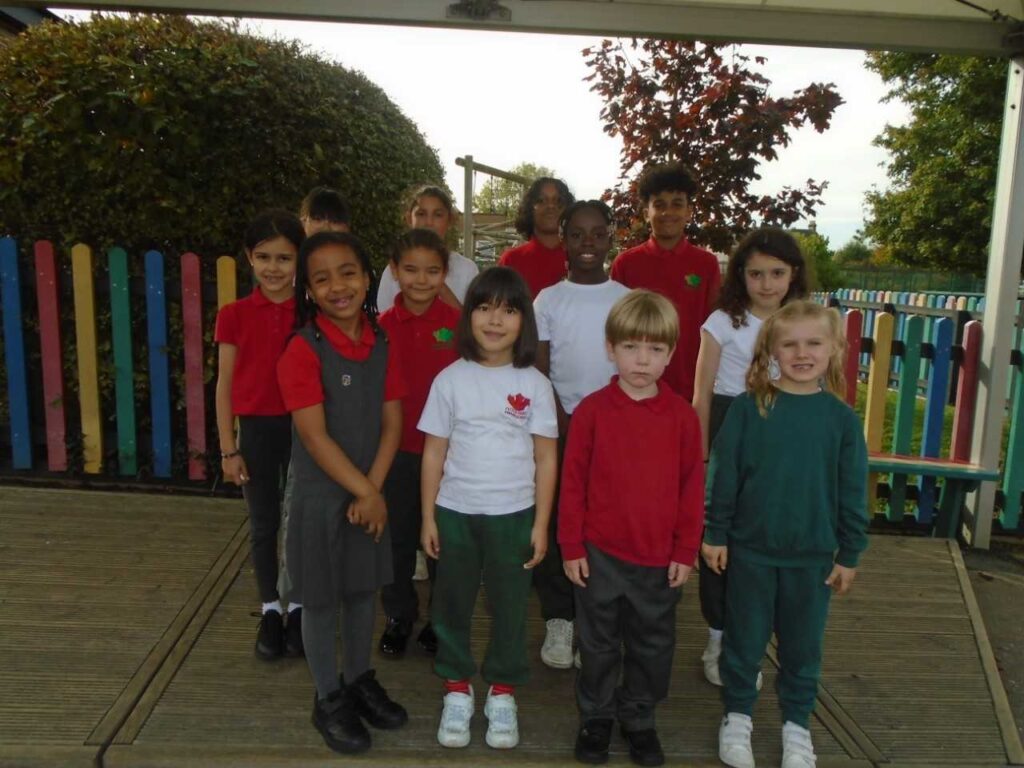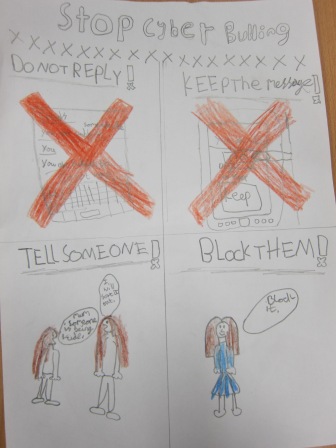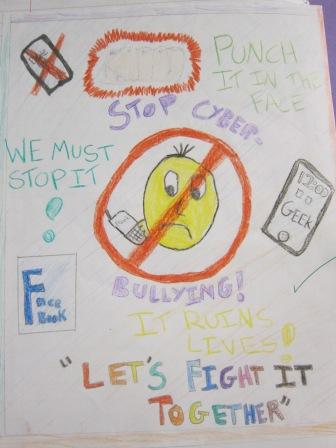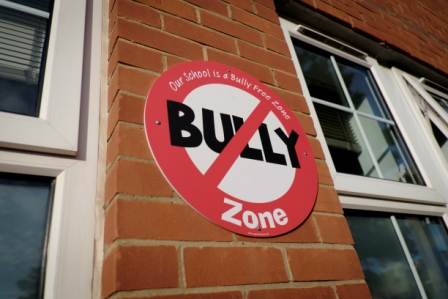 Holly Park aims to ensure that all members of the school community feel welcome, safe and happy and so are able to learn and achieve. Bullying of any kind prevents this from happening. Bullying makes people feel unsafe.
Holly Park aims to ensure that all members of the school community feel welcome, safe and happy and so are able to learn and achieve. Bullying of any kind prevents this from happening. Bullying makes people feel unsafe.
As a school, we take bullying seriously. Pupils, parents and staff should understand that reporting bullying is essential, and be assured that the school will support them fully whenever bullying is reported. It is the responsibility of all members of the school community to implement the Anti-bullying policy.
- We have a child friendly anti-bullying policy: Child Friendly Anti Bullying Policy
Here are our Anti Bullying Ambassadors

What is Bullying?
- Bullying is not always easy to define, however most cases include:
- Constant and deliberate hostility and aggression towards a victim
- A victim who is less powerful than the bully
- An outcome which is always painful and distressing to the victim
Our school definition of bullying is:
“Bullying is a repetitive series of actions, carried out on purpose, and designed to hurt someone’s feelings and make them feel ashamed of who or what they are. We will not accept it at Holly Park” Holly Park School Council, April 2012
A recent court case defined bullying as….
‘The actions of an individual or group, that causes suffering to a less powerful individual or group – whether physical or mental – over a sustained period of time.’
There are different kinds of bullying :
- Physical – Pushing, kicking, hitting, pinching, any kind of physical aggression and damage to or appropriation of a person’s property
- Verbal – Name calling, tormenting, threats, threatening gestures, ridicule, humiliation or the use of put-down comments or insults e.g. with regard to another child’s family, their race, their (perceived) sexuality, gender, personal cleanliness etc, deliberately lying about what other people have done or deliberate exclusion from activities and friendship groups
- Racist – Racial taunts, graffiti and gestures
- Sexual – Unwanted physical contact, sexually suggestive comments, or homophobic comments
- On line – On line bullying is an extension of bullying behaviour. It involves technologies and online communication such as mobile phones, facebook, snap chat etc. It often involves quite a wide audience.
- More subtle forms can include nasty looks, emails, texts, anonymous phone calls and pointedly laughing/giggling at or whispering about someone. It can include intimidation and threatening behaviour, including blackmail
The Holly Park School Council agreed that whatever its form, bullying consists of the following factors:
- It is ongoing and frequently repetitive, and takes place over a period of time
- It is deliberate
- It is based on a difference in power (age, strength, confidence, number of friends, etc)
- It has a serious effect on the target, including feeling ashamed, feeling like they don’t want to be at school, or feeling that they wish they could disappear completely
Effective anti- bullying practice gives all children the assurance that they are cared for in a safe and friendly environment.
What are the Effects of Bullying?
‘Bullying can produce feelings of powerlessness, isolation, damage the sense of worth, and sometimes lead to victims feeling they are at fault.’ Department of Education
‘Bullying causes harm to those who bully, those who are bullied and those who watch. Being bullied undermines self esteem and confidence, sometimes with devastating consequences.’ Anti – Bullying Alliance 2006
Indicators of Bullying
- Change in behaviour – withdrawal, moody, tearful
- Items of clothing, property, schoolwork lost or damaged
- Deterioration in educational attainment
- Reluctance to attend school
- Sleep problems
- Money going missing
- Frequent injuries
- Increased levels of aggression
- Headaches, stomach aches, feeling unwell
- Increased internet, mobile phone use
- Attention seeking
Aims and objectives
- We aim to create a safe and secure environment where all can learn without anxiety.
- We aim to provide a consistent school response to any bullying incidents.
- We aim to make all those connected with the school aware of our opposition to bullying.
- We aim to make clear each person’s role with regard to preventing bullying at our school.
 Our Anti- Bullying Charter
Our Anti- Bullying Charter
- We will work to ensure that everyone believes in themselves and has respect for themselves
- We will promote tolerance and respect including respect for difference and diversity
- We will take bullying seriously
- We will work to ensure that our school community knows what bullying is
- We will make sure that everyone knows that bullying is unacceptable at our school
- We will make sure that children who experience bullying know how to get help
- We will offer children who bully help to understand the consequences of their actions
- We aim to respond to bullying consistently
- We will work together to do all we can to prevent bullying at our school
- We will contribute to local and national anti- bullying events
- We underpin our responses to bullying by having
- Positive leadership from staff about how bullying is dealt with
- Periodic consultation with children to find out what bullying occurs, when, where and by whom
- Mixed age activities throughout the year – e.g Buddy systems and House Challenges
- Follow up with victims of bullying and bullies themselves
What we are doing at Holly Park
 At Holly Park, we use the Restorative Approach when dealing with problems and when managing unwanted behaviour. The emphasis of the Restorative Approach is placed on affecting real change, above the need for blame and punishment. By doing this, we are able to create an environment where children have the opportunity to reflect upon and change their behaviour. Children feel a sense of fairness because they can explain things from their point of view and they feel listened to whilst also understanding how their behaviour has affected others.
At Holly Park, we use the Restorative Approach when dealing with problems and when managing unwanted behaviour. The emphasis of the Restorative Approach is placed on affecting real change, above the need for blame and punishment. By doing this, we are able to create an environment where children have the opportunity to reflect upon and change their behaviour. Children feel a sense of fairness because they can explain things from their point of view and they feel listened to whilst also understanding how their behaviour has affected others.
Anti-Bullying Week
The theme for Anti-bullying week this year was “One kind word.”
The children had a ‘one kind word’ lesson on kindness which included a power point presentation and a short video. The children also looked at our child friendly Anti-bullying policy during the week. We have a child friendly policy which you may like to discuss with your child at home. The children have also used the class buckets to think of positive and kind things about their classmates. They participated in a lesson about kindness relating to the Rights. They drew around their hand and wrote down on each finger the name of an adult in school they can talk to when they feel worried, upset or have a problem. Then all around their hand they wrote which articles link to anti-bullying, being listened to, feeling happy, being safe etc. Today as part of supporting our International charity UNICEF, the children wore blue to raise awareness for children’s rights.
Anti Bullying Award – Highest level of Award
 We signed up to be part of the Anti-Bullying Alliance project called ‘All Together’. It is a whole school approach and makes a school reflect on how it tackles bullying. The programme included online staff training, pupil well being audits, adjusting policies. Assemblies, the restorative approach, audits, resilience programmes etc.
We signed up to be part of the Anti-Bullying Alliance project called ‘All Together’. It is a whole school approach and makes a school reflect on how it tackles bullying. The programme included online staff training, pupil well being audits, adjusting policies. Assemblies, the restorative approach, audits, resilience programmes etc.
The work covered a whole academic year. We submitted our evidence and was awarded the GOLD award for anti-bullying. The assessors said ‘Thanks for all the work you’ve done on the All Together programme. I’m very happy to let you know that you’ve done a great job of demonstrating your work to reduce bullying and we’re awarding you All Together School GOLD status’
At Holly Park we participate in Anti- Bullying week and there are opportunities for pupils to undertake work on bullying issues from EYFS to Y6. The anti- bullying message is evident.
All staff receive annual training and key staff will receive training in specialised Anti- Bullying strategies – e.g Circle of Friends, Solution focused approaches and Peer Mediation.
To children who experience bullying:
- We will assure them that the issue will be taken seriously
- We will intervene (informed by the victim) in a way to avoid escalating the problem
- We will monitor and review
To those who bully:
- We will hold them to account for their behaviour
- We will face them with the harm they have caused
- We will give direction to help them behave in ways that do not cause harm
- We will offer steps they can take to address the harm they have caused
To the bystanders or those affected by the incident:
- We will aim to give them skills to show them how they could have intervened effectively
- We will involve them in the reparation process
- Restorative Justice is one method of intervention we may use
Those who have been harmed need:
- Someone to listen
- Space to think and calm down
- Be informed of progress
- The person who has harmed them to understand and acknowledge the effect of their actions
- A sincere apology
- If possible for things to be put right
- Reassurance that it won’t happen again
- A sense of justice
- A feeling of being in control
Those who have caused harm need:
- Time to think
- Someone to listen to their story
- To be able to explain themselves
- A chance to apologise
- To be able to put things right
- Reassurance that the matter is finished and that they can move on
For restorative justice to work, all pupils should be treated with respect, there needs to be good communication, a focus on problem solving, all are involved in decisions about a way forward and there is a willingness to listen to others.
What to do if you think your child has been bullied
 If an allegation of bullying has been brought forward by a parent, and not witnessed by the school then there will be an initial period of investigation – including observation and speaking to the children involved. The parents will be informed of the outcome. If the allegation is believed to be true then it will be dealt with as above. If it is not believed to be true then we will continue to monitor for an extended time.
If an allegation of bullying has been brought forward by a parent, and not witnessed by the school then there will be an initial period of investigation – including observation and speaking to the children involved. The parents will be informed of the outcome. If the allegation is believed to be true then it will be dealt with as above. If it is not believed to be true then we will continue to monitor for an extended time.
In more extreme cases, for example where initial discussions have proven ineffective, the Headteacher may contact external support agencies.
In all instances an ‘Allegation of bullying’ form will be completed by the school. This includes details of what has happened, actions so far, who is involved and future actions.
After initial discussion and action (if bullying IS happening) then there will be a review meeting approx two weeks later to see how things are progressing
If staff become aware of any bullying taking place between members of a class, they deal with the issue immediately. The staff member will inform the Deputy Head or Headteacher. There will be support for both the victim of the bullying and the bully, and a consquence for the child who has carried out the bullying. We spend time talking to both children: we explain why the action was wrong, and we endeavour to help the bully change their behaviour in future. The parents of both children are informed.
Parents are on no account to approach another child or parent without first involving the Headteacher or other Senior Staff member. Experience has shown that when the school is involved, issues and concerns are likely to be resolved with acceptable outcomes.
Preventing Bullying – Being Pro Active
Prevention is better than cure. At Holly Park everyone is vigilant for signs of bullying and always take reports of bullying seriously. We use the following methods for recognising and preventing bullying:
- Staff will be on duty at break and lunch to ensure high level of supervision
- Strong achievement culture rewarding positive behaviour. Positive behaviour policy with clarity of behaviour expectations, sanctions and rewards
- Assemblies about bullying behaviour
- Annual questionnaire to all pupils to gather information on extent of bullying and locations
- Development of Social, Emotional and Behavioural Skills
- Use of Behaviour Support Plans to modify bullying behaviour
- Regular focus by the School Council focused on anti-bullying issues including organising events for anti-bullying week
- Holly Park is an official Rights Respecting School sponsored by UNICEF
We want to teach our children the skills which will build their self-esteem and empower them to take responsibility for themselves and give them the power to practise these skills.
We want to promote pro-active strategies to prevent incidents becoming bullying.
- Ignore
- Talk Friendly
- Walk Away
- Talk Firmly
- Report
Ignore:
- Pretend you didn’t hear it.
- Do not make eye contact.
- Maintain positive body posture (calm, confident).
- Think positive self-esteem statements.
- Count to five in your head slowly.
- Take deep breaths.
Talk Friendly:
- Use a calm voice.
- Maintain eye contact.
- Confident body language.
- Maintain relatively close body proximity.
- Use “I” statements – I feel ……. when you…….. because……..
Walk Away:
- Stand tall, head up high.
- Mouth closed.
- Look confident.
- Do not use eye contact.
- Walk somewhere, preferably towards a congested area or to a safety zone (teacher).
- Do not look back. Walk confidently, don’t run.
Talk Firmly:
- As per Talk Friendly.
- Use an assertive voice, slightly raised.
- Tell them to stop it.
- Re-state your “I” statement. eg. I said…….
- State the consequences of continued bullying.
Report:
- Walk away and tell a staff member.
- Go to a safety zone.
- Bystanders – support and report.
- Report, report, report until somebody listens.
Reporting Vs Snitching
- Children need to know the difference between reporting and snitching.
- Reporting is helping/getting yourself out of trouble.
- Snitching is trying to get someone in trouble using a whiny voice.
Prevention of bullying in relation to the ‘PREVENT’ Duty
We are aware that we may need to keep an extra eye out to deal with bullying in regard to pupils of certain races, religions or who are refugees at times when there are high level incidents reported in the news from around the world.
In terms of prevention we ensure that our curriculum through PHSE, RE and our focus on SMSC and British Values ensures that pupils are open minded and have respect for everybody regardless of their religious, ethnic or cultural background.
We record all incidents, analyse trends and address any trends or themes we notice.
What can children do if they are worried about bullying?
 Where children are the targets of bullying behaviour, they have several options:
Where children are the targets of bullying behaviour, they have several options:
- To tell a trustworthy friend
- To tell a trusted adult, such as a member of staff or a parent
- To tell a School Council representative
- To stand up to the person who is using bullying behaviour and tell them to stop
- To put a note in the Worry Box
When children witness or are aware that bullying behaviour is happening, it is their duty to do something about it. Although this situation can be hard, they need to support the child who is being upset or intimidated. This will mean they need to:
- Tell their teacher
- Tell another member of staff
- Tell their parents or another trusted adult
The chair of governors, Clare Hegarty, is the governor responsible for safeguarding.
Children who use bullying behaviour may often need additional support themselves, as it is often a sign of unhappiness, insecurity or loneliness. This does not, however, justify the use of such damaging behaviour against others. If a child is identified as a bully, then it is highly likely that their parents will be invited in to help provide support, and to be told of their child’s behaviour.
You can read more about Holly Park’s Anti bullying policyhere
Suggested Websites
www.anti-bullyingalliance.org.uk



